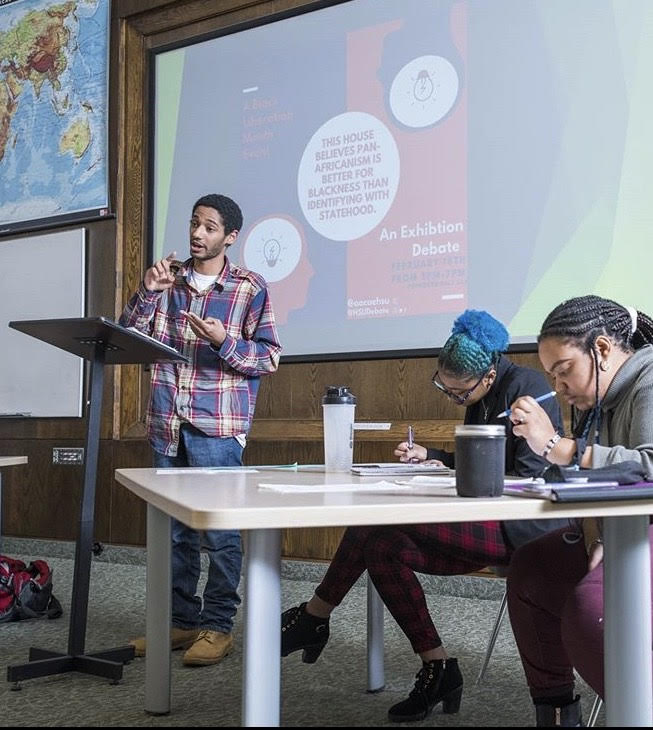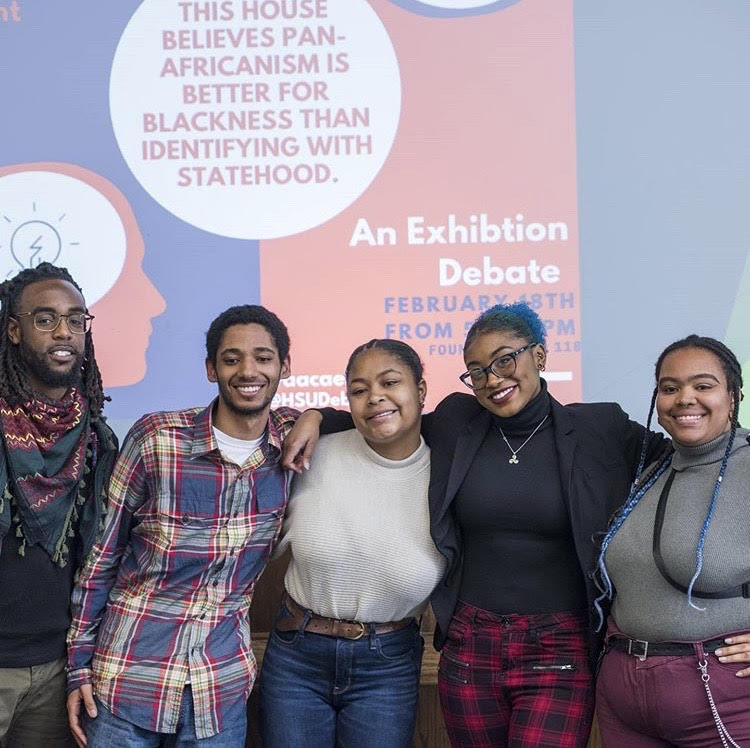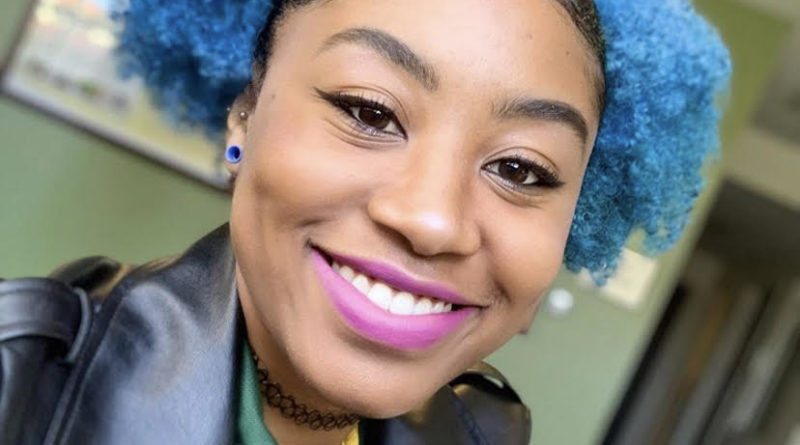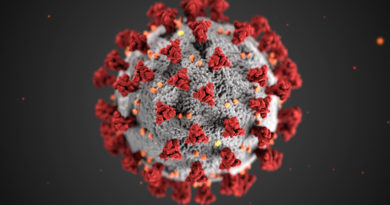Conquering speech and debate as a Black woman
Speech and debate has historically been dominated by white men but Arynn “Blue” Baldwin is challenging this tradition. She’s Humboldt State University’s current president of the speech and debate team and she’s achieving major accomplishments.
Baldwin, who likes to go by Blue, on account of her blue hair, is a first generation college student in her fourth year, studying psychology and communications at HSU. Originally, Blue is from Palmdale, California and she came to HSU to get away from her family but she ended up falling in love with nature and the people up here.
Joining a speech and debate team was something that Blue has always wanted to do but since her high school didn’t have one, she jumped at the opportunity to join HSU’s debate team in her second semester during her freshman year.
Structure of speech and debate
HSU participates in british parliamentary style of debate, in every round, there are four teams each made up of two people. Teams are assigned a position on a topic, either in favor of the topic or against it and they are assigned front half or back half. For either side, front half means that they’ll be arguing during the first part of the debate and back half means they’ll be arguing during the end of the debate. Teams are given 15 minutes to prepare a seven minute speech without access to the internet. The only thing that they have to help them is their prior knowledge and a case book which is a binder of briefs with information like statistics and quotes that teams might find useful.

Tournaments can last several days and host hundreds of teams. Participants compete in a certain number of rounds each day and teams are ranked one through four with one being the highest rank and four the lowest.
The team practices on Monday, Tuesday, Wednesday and Thursday, with each session lasting two or three hours. This year everything is online and although Blue enjoys being able to debate from the comfort of her bedroom, she says that it’s also more exhausting since tournaments run later than usual. It’s also challenging because people have internet and technology issues which actually end up hurting participants’ scores.
Racism and sexism in speech and debate
Speech and debate may seem pretty straightforward but Blue says that it gets really intense and that racism and sexism are actually very common. Sometimes it’s the topics themselves that are racist or sexist, other times, it’s her competitors and even the judges.
“It’s really frustrating because I don’t feel like my voice is heard as much as other individuals because it’s not, and I acknowledge that and I’m aware of that. And I know that the only thing that I can do about that is, continue to share the knowledge and information that I have. Whether or not they want to take in the information is not up to me.”
Blue
Blue thinks it’s necessary to have challenging conversations but she distinguishes between a conversation that is difficult but education and one that is simply harmful. Many participants also attack their opponents but Blue doesn’t think that this is productive, in fact, it’s toxic.
“When I think of competition, I think of “how do we disagree? How do we not work? And what does that mean,” Blue said. That’s what competition is, it’s about learning, right, it’s about education, it’s about bettering yourself, because that’s what competition should be, it shouldn’t be toxic.”
One particularly difficult experience that Blue recalls was during her second tournament, in which she, one of only two Black people in that entire tournament, had to argue that segregation was a good thing. Blue said that on numerous occasions she has experienced her competitors and the judges not taking her seriously because she’s a Black woman.
“There’s not really much that you can do, and it’s super frustrating and that’s why so many people quit,” Blue said. “That is exactly why we don’t see that many marginalized people in debate. That is exactly why women feel silenced in debate, and they feel like this vulnerable space is toxic but it doesn’t have to be.”
When this happens, Blue makes an effort to talk to her competitors who made the problematic comments after the round so that she can get them to understand why and how what they said was hurtful and harmful.
“It’s really frustrating because I don’t feel like my voice is heard as much as other individuals because it’s not, and I acknowledge that and I’m aware of that,” Blue said. “And I know that the only thing that I can do about that is, continue to share the knowledge and information that I have. Whether or not they want to take in the information is not up to me.”
The debate team’s coach Aaron Donaldson recognizes that Blue has been the victim of many racist and sexist experiences but he said that she handles these situations well.
“She’s really good at trying to learn from it,” Donaldson said. “And at staying committed to the process of what we try to do which is building the kinds of social practices that we’re going to use to respond to that.”

Blue’s style of debate is very personal, she said that she doesn’t use “debate speak”, which isn’t something that’s very common. According to Blue, traditional debate style is very structured and robotic.
“That’s not who I am. It’s not gonna go into my debating style like, I want to sit here and tell you a story and I want to give you facts and I want to make you believe it and I want to make you feel it,” Blue said. “That’s what I want to do.”
Blue’s former speech and debate partner Fabian Cuevas, who was on the team before Blue joined said that Blue has shaped the program into a whole different team.
“I mean that in the most positive way, it’s changed for the better,” Cuevas said. “It’s obviously been a place where it no longer feels like a constant need for competition, but an actual team that when you join, you’re joining to help yourself grow and to learn how to work with others.”
Recently, Blue and her speech and debate partner, Carina Masters, won second place overall in the Lewis and Clark Speech tournament in duo’s speech in the senior division, there were about 70 different universities in that tournament.
Other hobbies
Besides debate, Blue has a number of other hobbies. Her bedroom walls are lined with pieces of her own artwork and poetry, she also loves singing and she does it any chance she gets. Blue also enjoys baking and she’s even gotten complaints from her roommates that they’ve put on a few pounds because of all of the treats she makes for them.

In her spare time, she also likes to workout since she was a cheerleader for 13 years. Blue also likes to do research on a bunch of random topics. Blue tries to learn a little bit about everything which really helps her out in debate, she likes to do this during the late hours of the night when her insomnia won’t let her sleep.
School is something that Blue really enjoys, she views school work as something that she gets to do rather than something that she has to do and she tries to connect whatever she’s learning to her life. After she graduates from HSU, Blue wants to go to Oregon state University to work on a masters and possibly doctorate degree in some field of neuropsychology.
“I really try to be proficient in everything that I do,” Blue said. “I also try to know a little bit about everything so that I can have a conversation about everything.”




